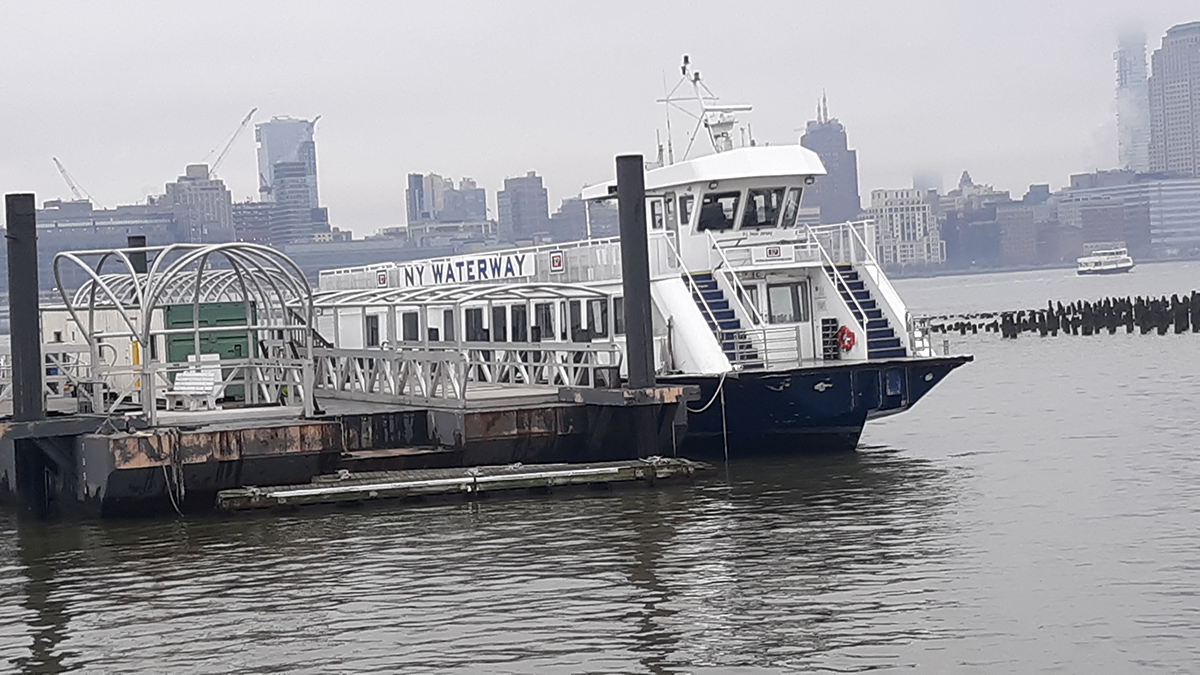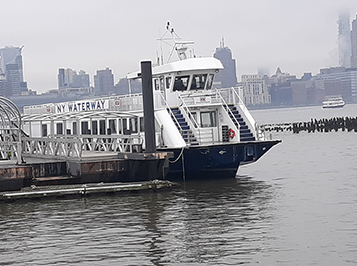Settlement agreement between City and NY Waterway requires 3 to 5 year lease for maintenance facility at Union Dry Dock

By Heather Gibbons | June 29, 2023
It was past midnight on Thursday, June 8th, when the Hoboken Planning Board called for a vote on NY Waterway’s (NYWW) application for site plan approval of its ferry maintenance facility at Union Dry Dock. Despite listening to hours of testimony from community members expressing grave concerns over the impact of NYWW’s facility on the area, including safety, environmental, and quality of life issues, the board voted unanimously to approve the application.
“Well, I think one of the things that should mitigate some of the concerns is the fact that this is — the application itself is a temporary application for a temporary use,” Hoboken City Councilman and Board member Jim Doyle explained.
However, the members of the human-powered boating community were not so sanguine, and worried that Hoboken was courting danger by allowing a busy industrial facility to operate adjacent to the Hoboken Cove – home to the largest paddling program in New Jersey – without proper safeguards. Oscar Hernandez of the Hoboken Cove Community Boathouse lamented that NYWW had a history of not responding to paddler’s concerns. “There has to be a way to communicate, to make sure we’re safe, to make sure the captains actually answer their radio calls all the time. We’re answered by pretty much every ferry operator in the New York Harbor except for NY Waterway.”
NYWW was applying for permission to build a ferry maintenance, storage and refueling facility at Union Dry Dock. This approval was required as part of a settlement agreement between the City of Hoboken and NYWW, allowing the City to acquire the Union Dry Dock property from NYWW for future use as a public park. In February, the City approved a three-year lease with NYWW that potentially can be extended for an additional two years while NYWW rebuilds its facility in Weehawken.
Planning Board Chair Frank Magaletta made clear at the beginning of the meeting that NYWW’s unpopular lease with the City would not be discussed, and instead warned the audience to keep their questions focused on land use issues. Donald Liloia, a NYWW Vice-President, provided the bulk of the testimony during the evening, answering questions from board members and the community about the company’s plans for the site.
The questioning revealed the scope of the operation, including:
- NYWW will store 20 ferries on the site, with no more than 5 boats active on any given day, and ferries leaving at approximately 5:30 AM and returning between 9 and 11:20 PM.
- After significant debate, NYWW confirmed that they will not dock boats or use the northern side of Pier 1, the northernmost pier.
- Maintenance crews will work 7 days a week, 24 hours a day, with much of the maintenance taking place on a travel lift barge out on the water.
- Refueling operations will remain in Weehawken until that facility is being replaced, which Liloia estimated would occur sometime in the 2nd or 3rd year of the lease. However, refueling may occur in Hoboken during unforeseen emergencies.
- Refueling will take place on land via a tanker truck that Liloia characterized as “a home fueling truck you would see on Hudson Street.”
Ferries are required to sound their horns while exiting the site, which will generally occur at 5:30 AM. - NYWW will remove the existing trees in the parking lot, creating 63 parking spots, which will be reduced to 45 after the Sinatra Drive Project begins and reclaims a 25 foot area along the roadway for a protected bike path and expanded sidewalk.
Paddler safety was a major theme of the evening. Carter Craft, an “occasional Waterway commuter and Boathouse board-member” said “the biggest things I worry about is that there will be an incident in the future between motorized vessels and other users of the cove or the beach, not unlike something that happened at Pier 79 in Manhattan in 2016, 2017, [where] eight kayakers got run over by a backing ferry.”
“Couldn’t we set a higher standard here when we’re reactivating a maritime industrial district next to a recreational park right up against a very treasured beach?”
Carter Craft, speaking about potential for fuel spills in the Hudson
Again and again, community members stood up to express their specific concerns, including what residents considered a perfunctory Neighborhood Impact Report. Indeed, NYWW was returning to the Board after having its application deemed incomplete because the ferry operator had failed to provide this report measuring the impact the maintenance facility would have on the surrounding area. The resulting report, produced and presented by Sean Delany of Bowman Engineering, was a disappointment to many of the people who spoke at the meeting.
Wendy Lau with the Hoboken Cove Community Boathouse pointed out that “the kayak program is one of the neighbors largely impacted by this operation. Why are the kayakers not mentioned in the report, and how is safety being considered as part of the impact report?” Carter Craft agreed, cautioning, “I worry that the Board, in taking the strictest view of what this lease is and what it does, we run the risk of marginalizing some very legitimate human health and public safety considerations that have been brought up when I read the report, the cursory report, and with all due respect to the testimony, thank you for that, but to have vessels and their wakes, you know, not considered in possible safety hazards, I think that’s an egregious oversight, quite honestly.”
Along with paddler safety, several speakers raised serious concerns regarding any environmental damage NYWW’s facility could produce. Noelle Thurlow of Resilience Paddle Sports, who operates youth and other environmental education programs at the Hoboken Cove, recounted conversations with boat captains who run their boat propellers close to shore, a practice that while illegal, from Thurlow’s experience occurs nonetheless, forcing long-dormant contaminants out of the silt into open water. “My question is about compliance. How do we make sure that the boat captains are minimizing the use of the prop[ellers]? . . The legacy contaminants are broadly distributed through the Hudson River. But my question is specifically because it’s next to a place where people get into the water.”
NYWW’s attorney objected to many of these questions and insisted the company would follow all local, state and federal regulations, an assurance that did not satisfy many in the room. “I think the risk of oil spill and contamination is probably bigger than some people realize,” said Craft. “And as, with all due respect . . . the Coast Guard’s threshold for reporting an oil spill is actually pretty low. . . as we all know, that’s not a big beach, it’s not going to take much at all to contaminate that beach.”
Resident Roberto Verthelyi urged the board to wield their authority responsibly. “Our waterfront is one of the biggest and most precious things that we have . . . so I would tread this very carefully. I would make sure that if there is an approval, that the approval includes all kinds of mitigation, if there are violations, and real consequences, and a real action plan and real communication both ways so that we can communicate with both NY Waterway and the Hoboken government . . . to make sure that our voices are heard.”
After more than 2 hours of testimony, the board closed the public comments and opened its own discussion, ultimately developing conditions for approval that included NYWW providing a detailed schematic of where all 20 boats would be docked, a commitment from them that all active ferries would be held at Piers 2 and 3 – those farthest away from the Hoboken Cove – and that the ferry operator meet at least twice annually with the Boathouse. In addition, Liloia agreed to investigate utilizing a refueling boom that would mitigate spills, and a larger, permanent boom for Pier 1 that would minimize wakes.
Twenty minutes after midnight, the board unanimously passed the application. “I’m fully supportive of this,” said Doyle, “and I also think it’s a necessary step to have a beautiful park here, and five years will go by or three years, very quickly, I hope. “
Related Links
NY Waterway submits deficient application to Planning Board for ferry maintenance facility
Hoboken Council approves 5-year lease for Union Dry Dock that allows the very uses opponents and the City fought to defeat
Mayor Richard Turner threatens to give NY Waterway the boot from Weehawken ferry maintenance site, urges regional solution
A green + blue vision for Union Dry Dock, an essential link in Hoboken’s waterfront park
Hoboken gains title to the Union Dry Dock property and initiates plans for a public park
After protracted delays, City takes action to expedite acquisition of Union Dry Dock site
After a contentious, multi-year battle, City will acquire Union Dry Dock
The transformation of Hoboken’s waterfront & creation of a continuous park
City to make offer to buy Union Dry Dock
2009 NJ Transit study identifies 5 sites more suitable for ferry facility than Union Dry Dock
Union Dry Dock: Potential Parkland for Sale


